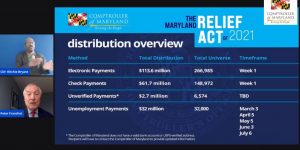
OCEAN CITY — Maryland Governor Larry Hogan on Monday signed the state’s Relief Act of 2021 and the state’s comptroller’s officer on Tuesday began sending out stimulus payments to eligible families across the state.
With the federal government stalling on a larger and more anticipated stimulus package, Hogan before the start of the current General Assembly session rolled out the state’s version of a COVID-19 emergency relief package, which, among other things, will provide direct stimulus payments for eligible low- to moderate-income families in Maryland.
Eligibility for the stimulus payments is based on the Earned Income Tax Credit (EITC), an option available to families with low-to-moderate income levels. Those who claimed the EITC last year are eligible for the direct stimulus payments, which total $300 for individuals and $500 for families. The income levels for the EITC eligibility are fairly low, however, an estimated 400,000 Marylanders will receive the direct relief.
In addition, the Relief Act of 2021 signed into law by Hogan on Monday repeals all state and local income taxes on unemployment benefits, providing another $180 million for those who have lost their jobs or have been laid off during the pandemic.
The relief package also includes sales tax credits for small businesses, at a rate of $3,000 per month for four months, or about $12,000. The package also extends unemployment tax relief for small businesses, insulating them against significant increases in unemployment benefits among other safeguards for small businesses struggling during the pandemic.
Maryland Comptroller Peter Franchot, a democratic candidate for governor in 2022, on Tuesday held a virtual press conference to announce how and when the stimulus payments might be hitting the mailboxes of those eligible. Franchot said with the governor signing the emergency legislation on Monday, those eligible could see payments hitting their bank accounts by the end of this week.
“The payments are going out of our office and are getting sent to banks,” he said. “Many will see payments by the end of the week. That’s happening today. 98% of payments will be processed by Friday.”
Franchot said his office is ramping up its website and hotline to field a myriad of questions about the direct stimulus payments, how to take advantage of the unemployment tax relief, the various programs for small businesses and others, taking a modest swipe at some of the failings of the state’s unemployment system during COVID.
“You’re not going to get a busy signal,” he said. “You’re going to get a live, friendly voice on the other end.”
Franchot also addressed growing concerns about the limited eligibility for the direct stimulus payments in Maryland.
“A lot of people are confused and frustrated that they are not included in this package,” he said. “We didn’t make the rules. We are not your governor. I know how important these payments are right now. I advocated for a package that was bold.”
Nonetheless, the comptroller praised his colleagues in Annapolis for getting a state relief package approved and signed in a short time, although, again, he said he believes it comes up short.
“I applaud the House and Senate for getting this passed, but I believe it falls short,” he said. “We’re the richest state in the richest country in the world, and we have the resources to do better than this.”
Franchot said the modest direct stimulus payments will provide little relief for many Maryland families struggling during the pandemic.
“No one believes a $300 or $500 check will make a dent in piles of debt for many Maryland families in need,” he said. “One-third of Maryland is in a deep recession we have an obligation to those families. We also have an obligation to the other two-thirds that are doing okay.”
It’s important to note Maryland’s relief package is just that, a leg up to the state’s families and small businesses in need until the federal government can get a much larger stimulus package approved.
“I just want to emphasize this is a small program,” he said. “This is not the large federal program we’re hearing so much about. It’s a very narrow relief plan for deserving people who need it. So many people are suffering right now.”
For his part, Hogan on Monday signed the legislation he had pushed for since the beginning of the General Assembly session.
“I introduced this emergency legislation at the start of the legislative session just a few weeks ago,” he said. “I said there wasn’t anything that could possibly be more important for the legislature to pass, and I asked the legislature to work with us in a bipartisan way to help those Marylanders who really needed our help. Today, I want to sincerely thank the leaders on both sides of the aisle for coming together to pass this measure with near unanimous support.”
Hogan praised state lawmakers for continuing to set an example in terms of providing relief for its citizens most in need.
“At a time when so many Americans have stopped believing that democracy can work for them, as Washington remains divided and gridlocked, Maryland has once again shown the nation that both parties can still come together, that we can put the peoples’ priorities first, and that can deliver real, bipartisan, common sense solutions to the problems that face us,” he said.
Hogan said a recent decline is some of the state’s key COVID metrics, there was still a long way to go.
“We still face a long and difficult winter ahead, and many Marylanders are still in need, but our vaccination rate is rising every day,” he said. “As we get more shots into the arms of our most vulnerable citizens, and all of our key health metrics are continuing to decline, and now with this relief act being signed into law, even more tax relief and economic stimulus help is on the way for our struggling families and small businesses.”

